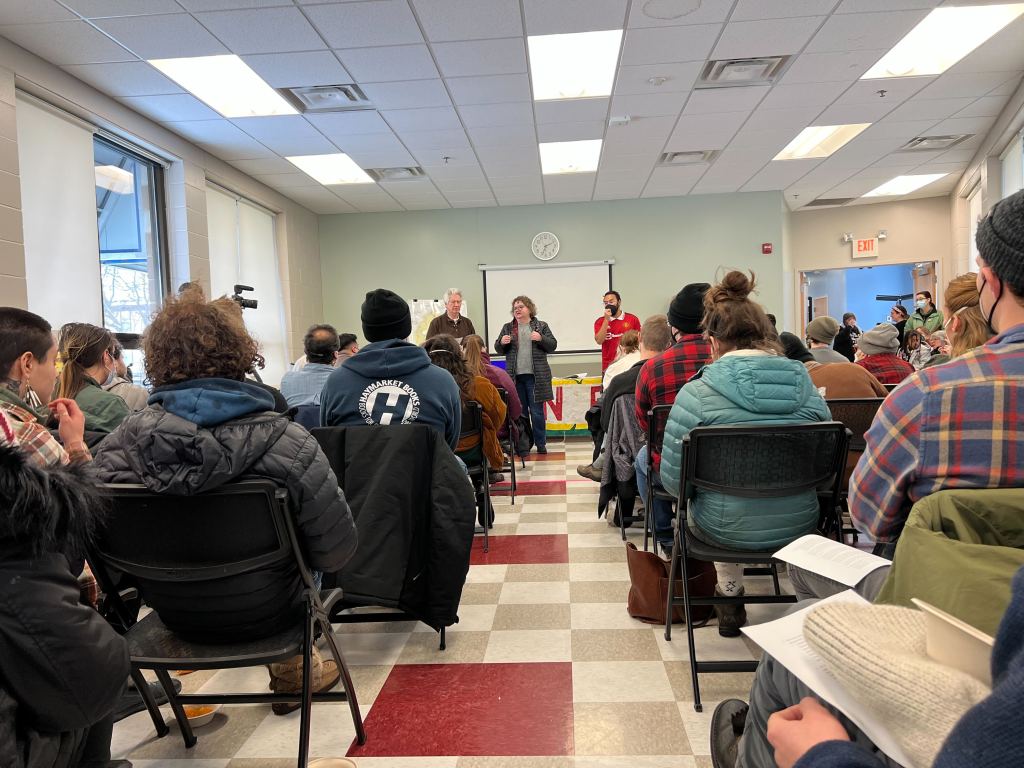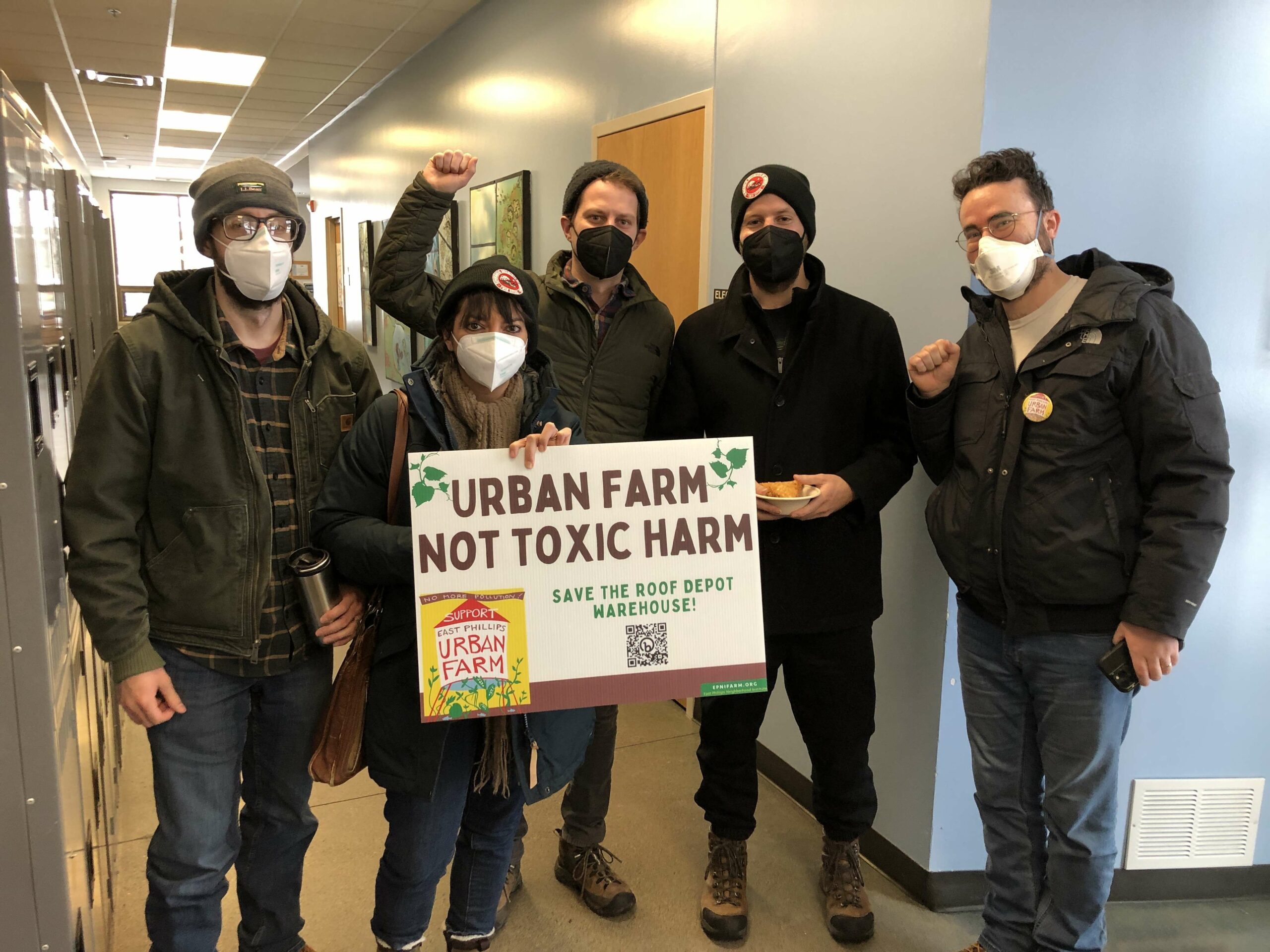On January 22, approximately 70 people gathered in the East Phillips Park Cultural and Community Center for a community meeting held by the East Phillips Neighborhood Institute (EPNI) to give an update on the East Phillips Urban Farm fight.
The meeting began with a song and a prayer by the group Hoka Hey. Then Joe Vital, EPNI’s lead Community Organizer, provided an introduction, acknowledging the police murder of forest defender Tortuguita in Atlanta, Georgia, and the mass shooting on Lunar New Year in Monterey Park, California. Vital connected these atrocities to the land-based injustices facing our neighbors in East Phillips and identified everyone in the room—and everyone involved in this fight—as land defenders as well.
Elizabeth Royal, the lawyer representing EPNI in its lawsuit, provided a legal update: the main lawsuit against the city is still pending in Minnesota District Court, and the decision on the injunction to stop demolition could be days away (At time of writing a decision has not been announced. There is also a case in the Court of Appeals suing the city for the inadequacy of its Environmental Assessment Worksheet (EAW), also pending.)

Royal then explained the mediation process that EPNI went through with the city last year, which took place after Mayor Jacob Frey vetoed the City Council’s approval of EPNI’s plan. Royal noted that, in the compromise proposal, all the city was willing to give was three acres of land that is almost assuredly polluted and right next to the fueling station at the City’s proposed Hiawatha Campus. Did the city see this land as fit for a farm? Did the city not realize that the urban farm in EPNI’s plan is indoors? Moreover, Royal noted that there are no guarantees in the deal. For these reasons, EPNI rejected it.
Royal acknowledged that they may not win the lawsuits, but they have a strong case, and have been aided by Greenfire Law, a law firm based in Berkeley, California.
Royal also noted the personal stakes she had in the fight, having worked for Larry Leventhal, a lawyer who represented leaders of the American Indian Movement (AIM), including after the 1973 Wounded Knee Occupation, and as an Associate Tribal Judge with Red Lake Nation (Anishinaabe). As a showcase for just how all-powerful the city is in litigation efforts, Royal admitted that when EPNI’s case was given to her, she solicited many of the major law firms in the city. Time and time again, she said, law firms rejected taking it on due to the fact that they are on retainer for the City of Minneapolis.
At that point, an elder in the Little Earth community spoke up and asked Royal about the other Congressional laws that promised to protect Native health, among other things, which the US government has broken time and time again. She noted that she was there at the Wounded Knee occupation, being Oglala Sioux and growing up on Pine Ridge Reservation. She said the government has disregarded Indigenous people, their water is bad, and their children attend schools that have substantial toxicity. She emphasized that these issues affected everyone, not just Native people.
Other people at the meeting also had questions and comments, with one person noting that this issue prompted the largest number of citizen comments in city history, with another noting the litany of laws the city was planning to break by proceeding with demolition. In addition, the Environmental Protection Agency (EPA) recently released new guidelines on January 11, 2023, that focused on addressing cumulative impact and its relation to environmental justice. Royal said that they had not yet had time to analyze the guidelines, but that they were reviewing them.
There was a powerful comment from another Little Earth resident, who spoke about her four-year-old granddaughter who was recently diagnosed with asthma. She described how she had to assist walking a neighbor home because she was in the middle of an asthma attack. She admitted she had heard about the Roof Depot fight for a while but she hadn’t listened; she said her neighbors aren’t listening because they are tired of not being heard; but with her granddaughter getting asthma and connecting it to air pollution, she said EPNI had her attention now.
Cassandra Holmes, a Little Earth resident and member of the EPNI board, explained that people who live in East Phillips have so much going on in their personal lives, there’s simply not enough time to pay attention. They know this neighborhood is toxic but don’t have the time or resources to know in what precise ways.
Dean Dovolis—architect and EPNI president—spoke to the attendees next. He shared that the city plans to begin demolition at the end of February, potentially February 27th. Dovolis also spoke about a potential plan co-drafted with Councilmembers Jason Chavez (Ward 9) and Andrew Johnson (Ward 12). It involves possibly using the state legislature to buy out and remove the Smith Foundry and Bituminous Roadways—the two other big polluters in East Phillips.
Holmes clarified the stakes of the issue: the goal is to end pollution in East Phillips. The compromises and plans with the city are often framed as the community getting something vs. nothing, but Holmes said that is a false way of framing it: in both cases, there’s still pollution.
Dovolis laid out three separate and ongoing strategies: the litigation, the negotiations, and the civil disobedience. EPNI looked for consensus and input on the direction it should take. People offered a variety of comments and questions. A fourth strategy of incorporating mutual aid alongside EPNI’s community outreach was suggested. By the end of the meeting, the consensus was clear: we must take all paths at once. Moreover, the stronger and larger our movement is, the stronger our negotiation power is.
By Connor S.

